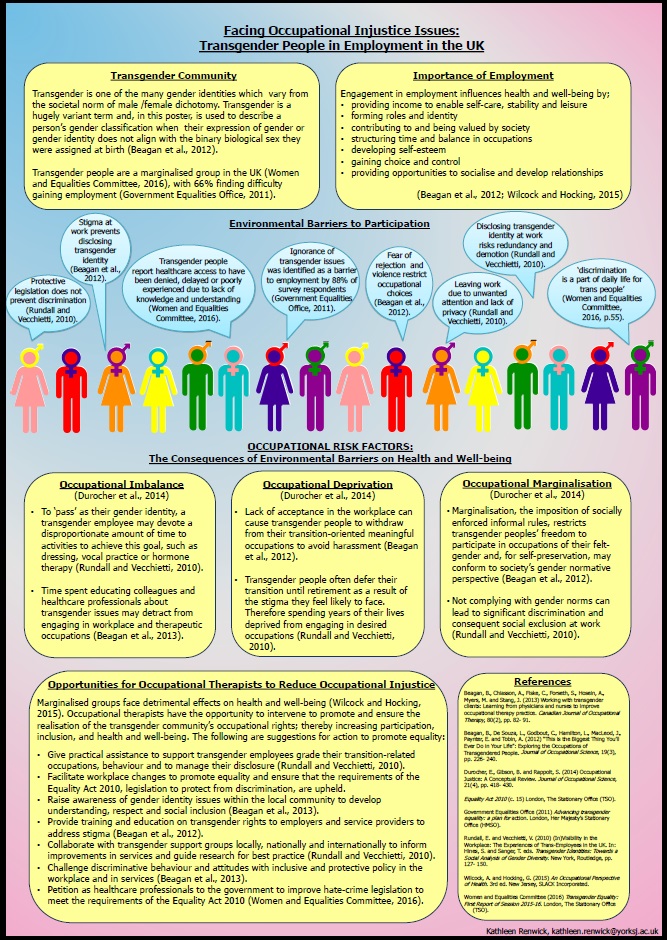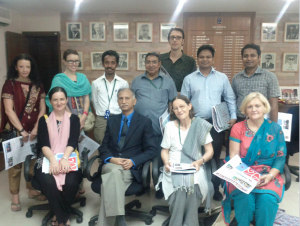At the beginning of semester 2, students on 1OT504 Health, well-being and participation were asked to read a biography/autobiography from a set list. In week 7, students facilitated a short discussion based on the book that they had read to the rest of their seminar group. Here is Francine’s reflection on this learning activity.

The supported open learning which asked for us to work in small groups to read, analyse and then present autobiographical novels to the rest of the seminar group was a fantastic way to learn about different health conditions, and the impact that a condition can have on a person’s life and their valued occupations.
A variety of books, which spanned a range of conditions from physical health (cancer and cerebral palsy) to mental health conditions (dementia and post-natal depression), allowed for us as students to present different books to the rest of the group, which helped each individual to broaden their knowledge on health conditions. Having a broad understanding is crucial, considering the dynamic nature of occupational therapy, and its unique ability as a profession to situate itself within different health, social care, education and third sector settings.
Whilst the internet is filled with information on diseases and illness, from a medical and diagnostic perspective, understanding how the condition affects the person’s ability to be an occupational being is harder to discover. This activity opened our eyes as students to the devastating affect that a health condition can have on a person’s ability to do occupations that they enjoy, whilst foregrounding the person’s unbelievable level of courage to continue embracing the life they lead. Through the written first -person account, the person’s resilience and ability to adapt, despite being tortured by their illness, became evident and offered a sense of hope and positivity.
Having an interest in mental health, , I was initially drawn to the book, An Unquiet Mind: A Memoir of Moods and Madness by Kay Redfield Jamieson, which reveals her personal account of living with bi-polar on a daily basis. At times reading this book was testing, as Jamison’s blunt and realistic account of living with bi-polar makes you stop and question how cruel life can be. Yet, as you are reading, you begin to adopt your role as occupational therapy student, and start to consider ways in which you would support a person with bi-polar to continue participating in those occupations that are meaningful and purposeful to them. The whole experience became somewhat like a case study.
Watching each group present their book to the rest of the seminar group was a moving, yet insightful experience. Each group captured the essence of their book perfectly and conveyed the personality and voice of their author through poignant quotes. After listening to each group present, I felt motivated to read some of the other books over the coming months. Through this method you are able to discover not only what the medical illness is, but the individual person behind the words and how they personally experience their illness.
Summary of An Unquiet Mind
An Unquiet Mind is a personal memoir that focuses on manic-depressive illness/bi-polar mood disorder. Kay Redfield Jamison voices her own personal difficulties of living with the disease, whilst providing a sense of hope, as she gives a first-hand account of her turbulent and chaotic life journey and the impact of her troubled mind. Jamieson recounts her life story and begins at childhood, where she discusses her military upbringing, her family member’s moods and personalities, and her creative hobbies; which are to form many of her occupations (reading, writing, and researching) in later life. As Jamison ages and hits her teenage years, she beings to be plagued by “black chaotic moods” (Jamison 2011 p.135) and finds herself in both positions of deep depression and uncontrollable high moments of elation. She begins to lose grip of reality, which cause her to consider ending her life. Whilst contending with these juxtaposed moods, and the cyclic form that these take, Jamison, as she transitions into adulthood, continues to develop as an academic (and a successful one at that, from researcher, to psychologist, to lecture to professor) and forms many intimate relationships with men who reassuringly understand her for who she is. As Jamison matures she learns to control her moods and begins to draw positives from them, she also learns that taking medication and seeking support is essential for her daily and academic functioning.
Overall, the aim of an Unquiet Mind is to help those who are faced with the disease realise that despite their rollercoaster life of ups and down, there is the possibility that and enriched and satisfying life can still be had. Moreover, Jamieson through her clinical, academic and political work aims to increases societies understanding of the disease, as one that should not be shrouded in stigma, but as a deliberating and harsh disease that has the ability to damage a person’s life considerably.
By Fran Gleadall – Part-time occupational therapy student (1st year)














